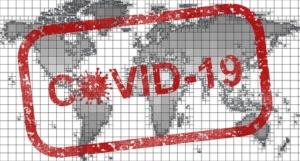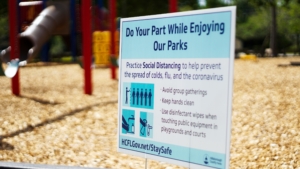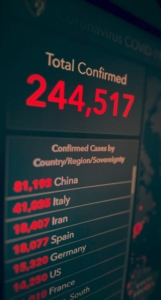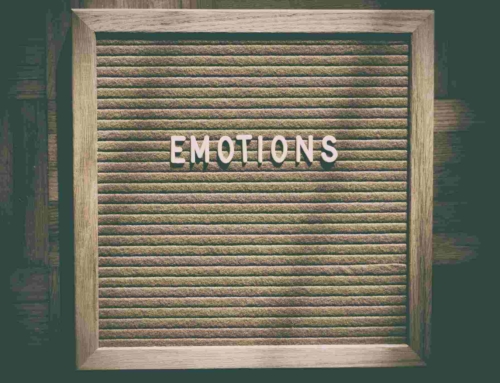A few weeks ago, I wrote an article entitled A Christian Counselor’s Contemplations on COVID-19; a reflection piece regarding the current COVID-19 situation and some of the deeper questions of life that I believe it’s forcing us to face. As I’ve continued to pray and seek the Lord’s face and will for my own life and practice, I’ve heard Him clearly say that there is something else that this pandemic is revealing.
In my last article, I said, “I shudder to think of the impact all of this is undoubtedly having on the rates of domestic violence, child abuse, pornography use, drug and alcohol abuse, depression, and suicide.”
 Lurking behind that statement is the reality of both our insatiable desire for as well as the severe limits of our need for power and control. That drive for power and control over our lives and the fear that we may lose it is something COVID-19 is demonstrating for all the world to see.
Lurking behind that statement is the reality of both our insatiable desire for as well as the severe limits of our need for power and control. That drive for power and control over our lives and the fear that we may lose it is something COVID-19 is demonstrating for all the world to see.
In this second of a three-part article series, we’ll take an in-depth look at this drive, how COVID-19 is impacting it, and conclude by beginning to look at ways to effectively respond to all of this.
The Ingrained Need and Drive for Power and Control
Our world is so fearful right now. People are so anxious and afraid, not just of COVID-19, but of all kinds of happenings both in America and around the world. Overall, rates of anxiety and depression appear to be on the rise.
In 2017, the APA released a nationwide poll stating that over two-thirds of all Americans were extremely or somewhat anxious about the health and safety of themselves and their families. More than a third of those who responded to the study said they were more anxious than they had been the previous year.
The study also revealed that Millennials were far more anxious than Baby Boomers. In 2018, the same poll was repeated and rates of overall anxiety rose by 5%. Rates of suicide, domestic violence, child abuse, drug and alcohol abuse, and pornography use have all been increasingly on the rise over the past several years. All of that was happening before COVID-19.
I can only imagine the sheer size and scope of all the ways the increased effect of loneliness caused by isolation is going to ultimately impact people. If you’ve ever read Robinson Crusoe or seen the Tom Hanks’ movie, Castaway, you can see for yourself the effects that long-term isolation can have. That’s why scientists and other support personnel going to Antarctica for 6 months at a time have to pass a battery of psychological tests in order to be allowed to winter over there.
I was talking with a woman the other day who said that when she took her kids out on a walk, in every house she passed the moms were yelling at their kids. In China, the rates of domestic violence cases reported to police tripled in February.
 Here in the United States, the National Domestic Violence Hotline is reporting an increase in the number of calls since the Coronavirus. There are many reasons why we’re seeing an increase in all those things, but one of the biggest reasons I would contend is humanity’s ingrained need for power and control.
Here in the United States, the National Domestic Violence Hotline is reporting an increase in the number of calls since the Coronavirus. There are many reasons why we’re seeing an increase in all those things, but one of the biggest reasons I would contend is humanity’s ingrained need for power and control.
Psychologist William Glasser, the architect of Reality Therapy, identified power and control as a normal need that is fundamental to all human beings. I would tend to agree, and I would say that we see this reflected throughout Scripture as well.
In Genesis 1:27-30, we see God creating humanity and giving them dominion over everything on earth. In Genesis 2:19-20, we see God bringing the animals to Adam and allowing him to name them all. In Deuteronomy 30:19-20, we see Moses pleading with the Children of Israel to “choose life.”
In Joshua 24:15, we see Joshua again imploring the Israelites to follow God, saying,“Choose for yourselves this day whom you will serve.” In John 7:17, Jesus in speaking to the Jews says, “If anyone chooses to do God’s will, he will find out whether my teaching comes from God or whether I speak on my own.” Again and again throughout the Bible, the free will of humanity and the choices people make both for good or for evil, leap off the page for us if we allow ourselves to have eyes to see this truth.
We see this simple truth reflected not only in Scripture, but all throughout everyday life as well. The red shirt or the blue shirt? Oatmeal or cold cereal? Spend time on your phone or spend that same time playing with your kids. Choosing to lash out at someone who has hurt us, or choosing to seek to understand, forgive, and reconcile with them.
Life is full of hundreds of such choices every day. The ability to choose, to have some semblance of power and control over our lives, is written into our DNA as human beings. The drive in and of itself is normal. It is natural. It is something that God gave us.
Unfortunately, due to the presence of sin in our world and within us, it is a drive that is tainted, marred, and skewed, and unfortunately often expresses itself in quite dysfunctional destructive ways. That stark reality is something else that COVID-19 is also revealing most clearly.
Drive for Perfection and the Fear of Judgment
“As Jesus and his disciples were on their way, he came to a village where a woman named Martha opened her home to him. She had a sister called Mary, who sat at the Lord’s feet listening to what he said. But Martha was distracted by all the preparations that had to be made. She came to him and asked, “Lord, don’t you care that my sister has left me to do the work by myself? Tell her to help me!”
“Martha, Martha,” the Lord answered, “you are worried and upset about many things, but only one thing is needed. Mary has chosen what is better, and it will not be taken away from her.” — Luke 10:38-41
How many of you ladies out there can relate to Martha? I know that there are many, many Marthas in homes and in churches and throughout the world. Now before we go on, we must ask — how did Jesus feel about Martha? He loved Martha. He adored Martha far more than she could ever possibly comprehend.
Ultimately, he died on the cross for Martha. Jesus wasn’t discounting Martha. He wasn’t saying that all of the housework, preparing the meals, being a good hostess, and so on wasn’t important. That’s not it at all. What He was in essence asking Martha was, “Martha, what’s most important here?”
What was most important was not being the perfect hostess and making sure that everything looked perfect, but to recognize that someone far more important than whatever was for dinner. The One who spoke the universe into existence and is the embodiment of perfection itself had given her the unique privilege of a personal visit from the Holy One.
Food wasn’t the most important thing. Heck, Jesus could have fed the entire house Himself, as He did in both the feeding of the 5,000 (Matthew 15:13-21) and the 4,000 (Mark 8:1-9). No, Jesus was saying that He Himself and everything He had to teach them were far more important — and Mary had made the better choice (to sit, listen, and learn).
Albert Ellis, the father of modern Cognitive Behavioral Theory, said that we often unconsciously live our lives by Absolutistic Musts, Shoulds, and Oughts. In other words, he pointed out that people live their lives by a lot of unwritten rules — premises of life that they accept as absolute and true — and quite often unrealistic and unattainable. Things such as:
- I’ve got to be a better person.
- I ought to be able to keep my home clean and organized.
- I ought to be able to keep my kids under control and well behaved.
- I should have been much more successful and productive than I am at this point in my life.
- I should be working out and eating better.
- I should be thinner and better looking.
- I ought to be a lot tougher and be able to handle more.
- I must be strong and hold it all together.
- I should be a better father, mother, son, or daughter.
- I’ve got to be a better provider for my family.
- I must make my husband, wife, mom, dad, or kids happy.
What’s really behind a lot of statements such as those is fear. We’re so very afraid of what other people will think. What would other people think about me if they saw my messy home? What would the neighbors say about me if they knew my kids were running out of control?
They would think I’m a bad mom. They would think that I’m a lousy father. They would think I’m a terrible housekeeper. They would think that I’m good for nothing. They would think that I’m just a fat, lazy, slob. They would know how much of a disappointment I really am. They would know that I’m a failure. They would know (what I already believe deep down inside) that I’m a horrible person.
That is the private inner life of a lot of people right there. Like Martha, so many of us are so very afraid. We are so fearful, allowing our fears to control us and attempting to exercise control because of them. We want other people to think that we have it all together. We’re so afraid that anyone would perceive us as being less than perfect.
How many of us make that same mistake of chasing that ever elusive idol of perfection? The perfect body, the perfect career, the perfect home, the perfect marriage, the perfect family, the perfect life — things such as these are the golden calves that so many people bow their knee to. As a clinician, I will tell you that perfectionism is one of the very most destructive forces that I see in my practice, bar none.
As a clinician, I often find that perfection is an idol whose luster really starts to wane for many people the closer they get to the end of their lives. Mortality is the ultimate dispeller of illusions, revealing to us by fire the true quality of the foundation upon which our lives have been built (1 Corinthians 3:10-15).
The late Erma Bombeck, a famous popular American writer, columnist, and humorist, was asked, “If you had your life to live over again, would you change anything?”
This is how she responded:
“Instead of wishing away nine months of pregnancy and complaining about the shadow over my feet, I’d have cherished every minute of it and realized that the wonderment growing inside me was to be my only chance in life to assist God in a miracle.
I would never have insisted the car windows be rolled up on a summer day because my hair had just been teased and sprayed.
I would have invited friends over to dinner even if the carpet was stained and the sofa faded.
I would have eaten popcorn in the “good” living room and worried less about the dirt when you lit the fireplace.
I would have taken the time to listen to my grandfather ramble about his youth.
I would have burnt the pink candle that was sculptured like a rose before it melted while being stored.
I would have sat cross-legged on the lawn with my children and never worried about grass stains.”
She ended with this …
“I would never have bought ANYTHING just because it was practical / wouldn’t show soil / guaranteed to last a lifetime.
When my child kissed me impetuously, I would never have said, “Later. Now, go get washed up for dinner.”
There would have been more I love yous … more I’m sorrys … more I’m listenings … but mostly, given another shot at life, I would seize every minute of it … look at it and really see it … try it on … live it … exhaust it … and never give that minute back until there was nothing left of it.”
From Eat Less Cottage Cheese and More Ice Cream: Thoughts on Life by Erma Bombeck
People at the end of their lives see what’s really important and what’s not in life. They understand the sheer folly and emptiness of trying to live up to impossible standards, and what life is truly all about.
Why do we honestly need to be so perfect though? Where do we get that idea that we have to be perfect in the first place? Personally, I’m convinced that it’s because we’re made in the image of God (Genesis 1:26-27; 9:6). Since God is perfect, we naturally desire that to be perfect, too.
Unfortunately, though, that once perfect image has become marred by the stark reality of sin that lives within all of us (Romans 3:10-12). We’re fallen creatures who live in a fallen world that’s dominated by empty icons and false images.
We get our false images from our broken families, our broken friends, our broken culture — from television programs, movies, music, the internet, and social media that drip and seethe with brokenness.
We’re bombarded by illusions based upon unrealistic expectations and untruths that offer false promises of happiness and fulfillment, but in the end create within us nothing but anxiety, fear, and eventual despair.
Proverbs 29:25 says, “Fear of man will prove to be a snare, but whoever trusts in the Lord is kept safe.” We all have a drive for acceptance. We want people to like us. We want to belong. We want to feel like we’re good enough. We naturally want to please others and to receive their praise, adoration, affection, and attention.
 As the Bible says though, that drive — which it calls the Fear of Man — is absolutely a snare. We end up fearing other people and their opinions of us. We fear what they would say about us to other people if they knew all our deepest, darkest secrets. We fear their judgment and condemnation. We fear being rejected. We fear being abandoned.
As the Bible says though, that drive — which it calls the Fear of Man — is absolutely a snare. We end up fearing other people and their opinions of us. We fear what they would say about us to other people if they knew all our deepest, darkest secrets. We fear their judgment and condemnation. We fear being rejected. We fear being abandoned.
What’s the way out of that snare? The Apostle Paul addresses that in Galatians 1:10, saying, “Am I now trying to win the approval of men, or of God? Or am I trying to please men? If I were still trying to please men, I would not be a servant of Christ.”
Paul understood very clearly what Jesus said of those who follow Him — that they wouldn’t fit in, that they would be rejected, and in fact, they would be hated. Why? It’s because those who love Jesus will be rejected and hated by the world. Jesus said they hated me, so they will hate you too because of me (John 15:18-27; 17:14). The Bible warns that anyone who makes himself a friend of the world makes himself an enemy of God (James 4:4; 1 John 2:15-17).
The central question is — whose opinion of you matters more? The opinion of other people? Or God’s? Who are you trying to please?
Tennis player Andre Agassi once said, “Image is everything.” He was absolutely right — but the question is, “Whose image?” Paul says in 1 Corinthians 13:12, “Now we see but a poor reflection as in a mirror; then we shall see face to face. Now I know in part; then I shall know fully, even as I am fully known.”
We were made in the image of God. Think about a mirror. When you look into it, you see your reflection. One of the key central truths of the Gospel is that the more intently we look into God’s mirror, the clearer we see who we truly are and all we were made to be. We find our true identity. We find our true purpose. We find healing. We find wholeness. We find peace. We find joy. Looking in God’s mirror, we see our true selves.
 You want to know why there’s such confusion in our society and the world today? We are where we’re at as a society right now because people, by and large, have turned away from God. People have stopped looking in God’s mirror and have walked away from Him (Romans 1:18-32).
You want to know why there’s such confusion in our society and the world today? We are where we’re at as a society right now because people, by and large, have turned away from God. People have stopped looking in God’s mirror and have walked away from Him (Romans 1:18-32).
As a result, most people throughout the world are running around scared because they’re chasing after false images, and as a result, they no longer know who they really are or what they were created for.
Instead, they put on masks and pursue false idols that will never satisfy. Those false images and the fear they generate control so many of us. They can become absolutely consuming . . . and if we allow them to control us, they can literally drive us — and others — to the point of insanity.
The Pathology of Power and Control
“So I say, live by the Spirit, and you will not gratify the desires of the sinful nature. For the sinful nature desires what is contrary to the Spirit, and the Spirit what is contrary to the sinful nature. They are in conflict with each other, so that you do not do what you want.
But if you are led by the Spirit, you are not under law. The acts of the sinful nature are obvious: sexual immorality, impurity and debauchery; idolatry and witchcraft; hatred, discord, jealousy, fits of rage, selfish ambition, dissensions, factions and envy; drunkenness, orgies, and the like. I warn you, as I did before, that those who live like this will not inherit the kingdom of God.” — Galatians 5:16-21
Why am I getting into all of this? Why am I bringing this up at all? It’s because I can almost guarantee you that we’re seeing a huge increase in those acts of the sinful nature during this time, and those things are all about our selfish desires for power and control.
So, what is it you’re honestly controlled by? For many who had severe anxiety before COVID-19, the answer isn’t the Spirit — it’s their flesh (the sinful nature). If you take a look at the acts of the sinful nature listed above, and really think about those acts, you realize that one’s selfish, self-centered desires for power and control are at the heart of many if not all of those sins. Take, for example, the first few items on that list.
The New Testament word for sexual immorality, which is used here, is the Greek word “porneia.” We get our modern word pornography from it and it refers to any form of sexuality that is forbidden in the Bible (i.e Leviticus 18) and is outside the Bible’s definition of marriage (Genesis 2:24-25).
The second term on the list is the Greek word “akatharsia,” which refers to uncleanness, lustful, impure, and grossly, wildly, extravagant, self-indulgent behavior. The third term on that list is the Greek word “aselgeia,” which refers to unbridled lust that is shameless and has no constraints or regard for anything moral.
Most deviant forms of sexuality have strong elements of exercising power and control over people for one’s selfish gain, or yielding oneself and giving power and control away to another. Much of idolatry is about one’s desire for power and control in order to soothe some sort of selfish yearning. Satanism, magic, witchcraft, and other occult practices are all about the desire for power and control, or the desire to give one’s power and control away.
By the way, the word used there in the Greek is “pharmakeia” — we get our modern word pharmacy from it — and it’s a word that not only refers to witchcraft and magic, but also to the use and administering of drugs. In other words, mind-altering substances.
Do we have an issue with drug abuse in our world today? Are there people out there who are under the power and control of drugs and alcohol? Think about that as you re-read through Galatians 5:16-21 again.
Do you have a problem with any of those things? Do they have power and control you? If so, may I humbly suggest you pray about that, seeking the Lord’s guidance and perhaps consider enlisting the help of a caring Christian counselor as well?
I hear someone saying, “Yeah, those things are blatantly obvious and extreme. I don’t do anything like that. How about things on that list such as envy, dissensions, fits of rage, or hatred? How are those things about selfish desires for power and control?”
To that I would say — let’s think about that. Why do people cause strife? Why do they cause division? Why do they argue and quarrel? James, the half brother of Jesus and one of the leaders of the early church, answers that question for us:
“What causes fights and quarrels among you? Don’t they come from your desires that battle within you? You want something but don’t get it. You kill and covet, but you cannot have what you want. You quarrel and fight. You do not have, because you do not ask God. When you ask, you do not receive, because you ask with wrong motives, that you may spend what you get on your pleasures.”— James 4:1-3
So, conflicts and fights between people really do come down in the end to battles for power and control for selfish gain. Sin, after all, is an attempt to meet a God-given, God-designed need in a twisted, dysfunctional, and destructive way. The Devil and his forces of darkness offer a powerfully attractive cheap substitute, corrosive to the souls of both themselves and others that will lead only to death for those who choose to follow their own selfish desires.
In 1983, the Eurythmics sang a song called, “Sweet Dreams.” Some of the lyrics of that song are quite insightful regarding overall human nature:
Some of them want to use you.
Some of them want to get used by you.
Some of them want to abuse you.
Some of them want to be abused.
Some of the most profoundly impactful mental health and personality disorders are those that involve problems related to power and control.
That Eurythmics song describes two significant personality disorders that are commonly referred to today as Narcissism and Codependency. Each of these disorders should be thought of as a continuum (I usually tell people to think of a 1-100 scale, with those on the upper end of the scale having a diagnosable disorder).
Narcissism
The term narcissism comes from the Greek myth Narcissus. In the story, Narcissus ends up falling in love with his own reflection. People who are truly narcissistic tend to love themselves and forget others.
People who are narcissistic are usually focused on meeting their own needs and desires and getting others to serve them. They tend to be highly manipulative and to exercise power and control over others to get their way.
They may go through periods of showing affection and care to others or buying them gifts as a way to ensure people will continue to care for them and give them attention. During times of distress, people who are narcissistic can often come across as immature to others in trying to get their way.
 These people use others and don’t usually take responsibility for their behaviors, tending instead to become highly defensive and to blame someone or something else for their faults. They’re frequently quick to point out the wrongs of society and the shortcomings of others, dishing out criticism and condemnation as if it were candy.
These people use others and don’t usually take responsibility for their behaviors, tending instead to become highly defensive and to blame someone or something else for their faults. They’re frequently quick to point out the wrongs of society and the shortcomings of others, dishing out criticism and condemnation as if it were candy.
They tend to have little empathy for others and have a difficult time understanding anyone else’s point of view, feelings, or needs besides their own or others who are like them. They are usually angry, anxious, fearful, jealous, and highly insecure people, who are attention and status seeking, and are focused on maintaining outward appearances and their desired public image of themselves.
Although they usually appear confident, secure, and even arrogant, deep down inside, they frequently have fragile egos and feel a great deal of shame and inadequacy. They are highly fearful people who are driven to avoid embarrassment, humiliation, public exposure, showing weakness, and ever losing power and control.
Their greatest fears though tend to be insignificance, abandonment by others, and death. The Bible is replete with examples of highly self-centered, manipulative, controlling people including: Laban (Genesis 24, 29-31), Jezebel (1 Kings 16, 18, 19-21), and many of the Pharisees of Jesus’ day (Matthew 23).
In Matthew 23, Jesus over and over again calls the Pharisees “hypocrites.” The word that’s used there is the Greek word, “hypokrites,” and it’s a word that appears to have originated from Jesus Himself from this very text. It’s a very insightful word that refers to an actor, a stage player, or a pretender — someone who is playing a part.
Actors in the ancient Greek theater of Jesus’ day would wear masks to show the character that they were playing. Anyone who has worked or lived with a narcissist will tell you that this is right on the money. They expend enormous amounts of time, effort, and energy wearing masks, pretending to be someone or something that they’re not, and trying to make others believe the lie as well. Jesus is saying, “Drop the mask, stop pretending, be real with your sin, and come to me.”
Codependency
People who struggle with codependency are at the opposite extreme, though they actually do tend to share a few of the same traits. People who are codependent tend to focus on meeting the needs and desires of others and to ignore their own. They seek approval from other people, typically have chronically guilty consciences, and take responsibility for the actions and choices of others.
They seek to be told what to do, allowing others to exercise power and control over them. They are quick to give power and control away to others. Since they tend to lack confidence in themselves, doing so makes them feel safe and secure.
People who are codependent are usually overly helpful, seeking to please and serve others to the point of martyrdom. In conflicts, they are usually quick to accept blame, even when it’s clear to others they aren’t at fault.
They tend to feel insecure, inadequate, and a great deal of shame as well, often feeling that they somehow deserve to be treated poorly. They’re often fairly fearful people, too, fearing being misunderstood, being judged by others, being perceived as selfish, being abandoned, being rejected, and being unwanted and not needed.
Ironically when it comes to marriage and relationships, people who are codependent can become just as controlling as narcissists at times, as these people tend to take on the role of parent to their spouse or significant other, rather than viewing themselves as an equal with needs of their own.
Over-responsibility is a way of life for these people. The idea of self care or saying the word, “No,” are often not in a codependent’s vocabulary. After all, in their minds, it’s their job to care for everyone else (never themselves, though) and things will fall apart if they’re not there. Many tend to become emotional chameleons, hiding their true feelings, and pretending everything is alright.
Eventually as frustration builds, some can become fairly vocal, laying on guilt trips, expressing their own disappointment and exasperation over not getting the help, support, understanding, and care they feel they need. If they feel they can no longer measure up or keep up, many will end up shutting down.
Many can go through periods in their lives in which they crawl in a hole of their own inadequacy and self loathing, unable to get out of bed, letting themselves go, shutting themselves off from the outside world, and falling headlong into the bottomless pit of depression and despair. Helpful Scriptures for these people include: Psalm 139:13-14, Proverbs 29:25, Mark 12:30-31, John 13:6-10, and Galatians 1:10.
I just described for you the basic dynamics that are going on in literally millions of homes throughout the world right now. They’re full of sinful men and women abusing themselves, abusing others, and allowing themselves to be abused. By the way, in the case of each of those conditions, for those people who actually have them, it generally requires the assistance of professional help in order to begin to conquer them.
As noted at the very beginning, the statistics and reports showed that things were difficult in those homes and relationships before COVID-19. Now? I can only imagine the sheer magnitude of the problem. So much time and energy wasted — keeping up appearances — looking like we’re perfect and having it all together when in reality we don’t and can never be perfect (or even be good, for that matter — see Luke 18:18-19).
Shame
What’s being revealed with crystal clarity in our world today is the age old truth that what people are truly controlled by is their own sin and shame.
How true the Scriptures are in describing the key issue of humanity — the power of sin that finds itself rooted in our shame. I’m convinced that shame is the most powerful negative force of all in human nature.
Shame gets in the way of relationships. It blocks our relationship with God, and also with others. It gets in the way of our own salvation and finding true happiness, contentment, fulfillment, wholeness, and new life in and through Jesus Christ. Although it’s related to guilt, shame goes much, much deeper.
Guilt says, “I did something bad.”
Shame says, “I am bad.”
Before the fall of humanity, the Bible says that Adam and Eve “were both naked and knew no shame” (Genesis 2:25). They had perfect, authentic, total transparency with God and with one another. They experienced true unity and oneness — everything was perfect and right with the world — in the beginning.
After they disobeyed God and sin entered their hearts and creation, what happened? They felt shame and they hid from God and each other. By separating themselves from God, they separated themselves from their true selves, damaging themselves and all humanity ever since in the process.
In choosing to sin, they began to hurt each other, and they began to hurt themselves. Where once there was unity and oneness, there was now division.
Instead of selfless serving of one another, there was now self serving and blaming each other. They hid from God. They hid from each other. They even hid from themselves (Genesis 3). And every human being born since that time has done the same.
The entire human race then has been infected by a poison that is far more deadly than COVID-19 will ever be. This one kills for all eternity. What’s the antidote for sin and shame?
The writer of Hebrews tells us:
“Therefore, since we are surrounded by such a great cloud of witnesses, let us throw off everything that hinders and the sin that so easily entangles, and let us run with perseverance the race marked out for us. Let us fix our eyes on Jesus, the author and perfecter of our faith, who for the joy set before him endured the cross, scorning its shame, and sat down at the right hand of the throne of God.” — Hebrews 12:1-2
Jesus Christ was despised, rejected, mocked, made fun of, blamed, falsely accused, spit on, flogged, and hung naked on a cross for us, exposed for all the world to see. No one has ever known the depths of sin, shame, and sorrow more than Jesus Christ.
We have a God who knows. We have a God who understands your pain. He didn’t just die for every single moment of sin, shame, sorrow, and pain you and everyone who has ever lived have ever had or will ever have. He experienced them.
He knows every single moment, every single shameful and painful memory you have had or will ever had, because He experienced them all. He felt all of the pain and anguish you have ever felt or will ever feel, died for it all, and rose again from the dead so that you could live.
Do you understand just how wide, how long, how high, and how deep Jesus’ love is for you? How could you not want to surrender your life to Him?
Those who surrender their hearts and their lives to Jesus, who make themselves a slave to Him, fixing their eyes upon Him, find rest and healing for their souls.
Peter said, “a man is a slave to whatever has mastered him” (2 Peter 2:19). The Bible makes it quite clear we are all a slave to something. Who owns you? Who or what is your master? Who or what has control over you? Are you a slave to sin, a slave to shame, a slave to fear, or a slave to God?
Jesus said in John 8:31, “If you hold to my teaching, you are really my disciples. Then you will know the truth, and the truth will set you free.”
He went on to declare, “I tell you the truth, everyone who sins in a slave to sin. Now a slave has no permanent place in the family, but a son belongs to it forever. So, if the Son sets you free, you will be free indeed” (John 8:34-36).
Would you like to truly be free? In Part Three, we’ll end our discussion by exploring how we can begin to throw off the shackles and really experience the freedom that Christ offers us — even in the valley of the shadow of COVID-19.
In the meantime, if any of this has sparked any issues for you, may I humbly suggest that you seek the Lord and also consider the assistance of a caring, trained Christian Counselor as well. They may very well turn out to be the tool that the Lord uses in His hand to bring healing and restoration for your soul.









